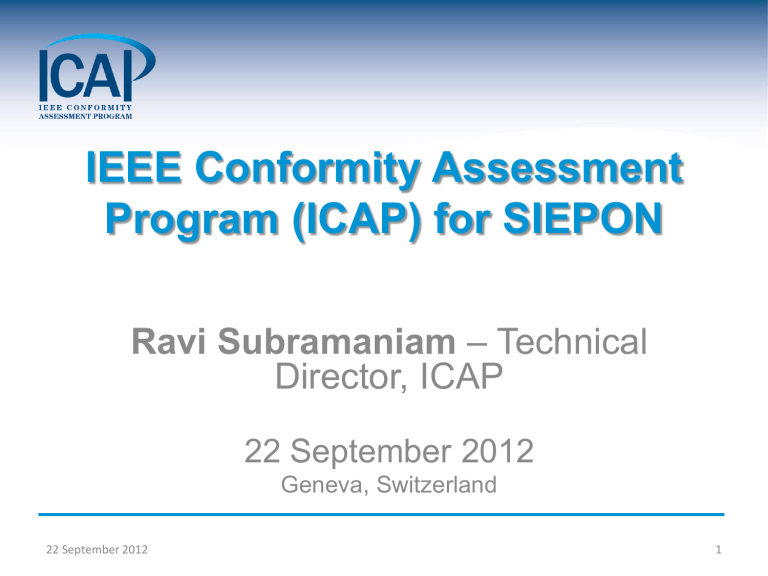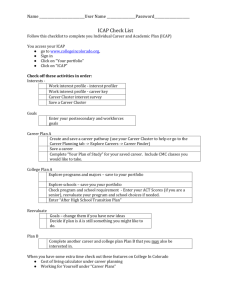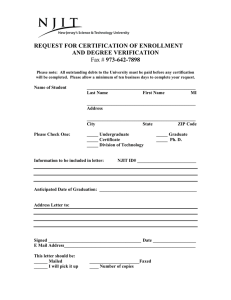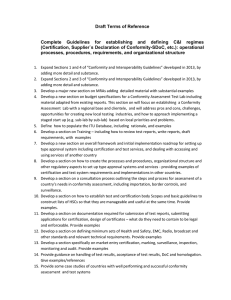IEEE Conformity Assessment Program (ICAP) for SIEPON Ravi Subramaniam – Technical

IEEE Conformity Assessment
Program (ICAP) for SIEPON
Ravi Subramaniam – Technical
Director, ICAP
22 September 2012
Geneva, Switzerland
22 September 2012 1
Why Does SIEPON need a Conformity Assessment Program?
• Conformity assessment is the accepted way of demonstrating that a product adheres to a standard
• Opportunity for participants to demonstrate adherence to Testing requirements
• IEEE 1904.1 standards based
• New Technology – Instill consumer or end-user confidence
• Supports free flow of SIEPON related products and services across national boundaries
• Increased adoption
3 possible models
Independent
Lab
Buyer
Vendor
• 1 st Party – Vendor
• 2 nd Party – Buyer or
User
• 3 rd Party –
Independent Entity
Conformity Assessment
System
22 September 2012 3
2
nd
Party Testing
IEEE/SIEPON
Certified
Product
• Logo Usage with TMLA
Buyer or
Network
Operator Tested
• ICAP Review Prior to Certification
• ICAP to Determine Surveillance
Needs
Product • 2 nd Party Lab tested
• Authorized Tools
3
rd
Party Testing
3
SIEPON
Certified
Product
• Logo Usage with TMLA rd
Party
Declaration
• Independent lab recommends for
Certification
• ICAP Issues Certification
• ICAP to Determine Surveillance Needs
Product
• Authorized Labs
• 3 rd Party Lab tested
• Authorized Tools
Self vs. 3
rd
Party Certification
• Speed of Implementation
• Time to Market
• Cost of Test Tools
• Vendor Misrepresentation
• Regulatory Risks
• End-Buyer confidence
Why interoperability is hard in digital communications?
22 September 2012
Interoperability
Conformance
Is transmission and reception good enough?
Are the “1”s and “0”s right?
Performance
“Can you hear me now?”
7
Considerations for a harmonized technical approach
•
Harmonized test procedures, use cases and derived test sets may enhance confidence in fielded interoperability
•
There may be no clear regulatory or coordinated marketplace demand driver to drive technical harmonization
•
Lots of choices and unique system implementation – I am special!
•
Testing – “to infinity and beyond”
• performance
• digital conformance (may be lots of permutations)
• interoperability testing (for all equipment models – software changes)
28 April 2012 8
SIEPON Certification Scheme
ISO/IEC Guide
65 Best Practices
Certification Authority
(ICAP)
ISO/IEC 17025 + competency requirements
Laboratories
Performance/Design
Requirements
Products
22 September 2012 9
Roles of Entities
P1904 WG
• IEEE 1904 Standard
• Test Specification
ICAP (Certification Authority)
•Entry/Exit Point for Certification Process
•Policies & Procedures
•TMLA
•Test Labs Facilitation
•Market Certification Program
•Certified Product Registry
•Steering Group (CASG)
Test Laboratories
• Independent
• 2 nd Party
• Test bed/tools implementation
IEEE
1904/SIEPON
Certified
Products
A Scenario to consider
Vendor submits application to ICAP
ICAP publishes on
Certified Product
Registry
ICAP – Initiates
Certification
Agreement with vendor
SIEPON
Certification
ICAP delivers certificate and authorizes logo usage
Vendors chooses lab from list of approved labs
Test Lab delivers
Final Test Report to ICAP for Review
Test Program starts at Test Lab
22 September 2012 11
Role of ICAP SIEPON Conformity Assessment Steering Group
• Entity based participation
– Comprising of Telecom Carriers, Vendors, Test Labs
• Major responsibilities will include
– Review & participate in creation of certification policy
– Determine compliance levels
– Act as advisors on test methods and interpretation of standards
– Test Lab Requirements/Audits
– Test Tool Validation
– Validate Test Report template
– Advisors on Marketing Initiatives
22 September 2012 12
Current Labs that participate in WG
• CableLabs (3 rd Party)
• RITT (3 rd Party)
• Shanghai Institute of China Telecom (2 nd Party)
• University of New Hampshire –Interoperability
Lab (3 rd Party)
• Future Lab in Japan
22 September 2012 13
SIEPON Brand Awareness
• Tested products will be awarded a certification mark
• The “SIEPON Certified” mark will convey trust in the device and the certification program.
• Drive to ensure that End-Users are committed to purchase certified products to minimize negative impact on the network
• Certified Product Registry to be maintained
22 September 2012 14
Questions & Discussion
22 September 2012 15



